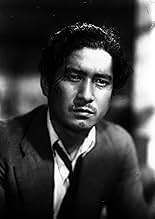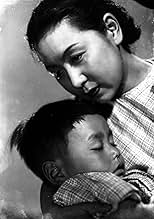Ajouter une intrigue dans votre langueA man returns from World War II to find his desperate wife had resorted to one night of prostitution to pay for their son's hospital bills.A man returns from World War II to find his desperate wife had resorted to one night of prostitution to pay for their son's hospital bills.A man returns from World War II to find his desperate wife had resorted to one night of prostitution to pay for their son's hospital bills.
- Prix
- 2 victoires et 1 nomination au total
Avis en vedette
10kerpan
Ozu's late film are far more varied than "common wisdom" would have it -- but, by any measure, "Hen in the Wind" (from 1948) is especially "atypical". This is the only Ozu film I've seen (out of 21 or 20) that has a tangible (and even raw) physicality -- it is more like proto-Imamura than "standard" Ozu (no -- Imamura was not yet working as Ozu's assistant -- that only began around 1951). Characters crawl, slither, and slide about. Sometimes, visually oversized bare feet stick into the foreground. Kinuyo Tanaka loses all self possession at the climax, and practically keens her dialog -- at a much higher pitch than I've ever heard her use in any other film.
This is an interesting story that deals with the collateral damage caused by WW2 (and the ensuing occupation) -- as it affected the lives of one young married couple. It was a flop with the audience, I guess -- so it became a path not traveled further. Artistically, it may not be completely successful, but it was a worthy effort.
This is an interesting story that deals with the collateral damage caused by WW2 (and the ensuing occupation) -- as it affected the lives of one young married couple. It was a flop with the audience, I guess -- so it became a path not traveled further. Artistically, it may not be completely successful, but it was a worthy effort.
"Record of a Tenement Gentleman" is Ozu's actual first post-war movie, but while it is set in a post-war environment it still relied a lot in his themes of family, father/mother and son, family love that Ozu had always explored, rather than discussing questions from a post-war society.
"A Hen in the Wind" does that. It offers a true war/post-war situation and deals with the people that suffer from it.
The story is quite simple and I've found some of his other movies to be more emotional. However, it is one of his most serious and violent. I do think Ozu is capable of adding more depth to his movies than what we see here, but I was very happy to find a different subject from what he does usually, explored in a such disturbing way. Ozu's themes are pretty much the same all over his work, but "A Hen in the Wind" stands out for a different kind of serious issue. It is, for that, very refreshing.
Very serious, very sad, very human, unexpectedly violent and a touching look at a post-war situation, it stands out mostly for being different from Ozu's usual themes.
"A Hen in the Wind" does that. It offers a true war/post-war situation and deals with the people that suffer from it.
The story is quite simple and I've found some of his other movies to be more emotional. However, it is one of his most serious and violent. I do think Ozu is capable of adding more depth to his movies than what we see here, but I was very happy to find a different subject from what he does usually, explored in a such disturbing way. Ozu's themes are pretty much the same all over his work, but "A Hen in the Wind" stands out for a different kind of serious issue. It is, for that, very refreshing.
Very serious, very sad, very human, unexpectedly violent and a touching look at a post-war situation, it stands out mostly for being different from Ozu's usual themes.
In postwar Japan, a wife has to deal with the consequence of her decision when she needed her son's hospital charges during her husband's absence. The theme, women's harsh reality at the time, is exceptionally serious for Ozu. It makes Hen in the Wind uniquely and intensely emotional, combined with Ozu's style, such as off-screen actions, implicative montages, and singsong dialogues.
Kaze no Naka no Mendori deals with a very serious social problem of the time -- the return of those away at war. Frequently supposed dead and often delayed by years after the war's end, returning soldiers came back to families that had had to make all manner of compromises and sacrifices related to their absence. Often the returnees found that their wives had re-married, or worse...
This is one such story. Unusual for Ozu in that it depicts actual physical family violence. A bit shocking if you are used to his other films, in which disapproval is often expressed with raised eyebrows and silence.
A good film with fine performances.
This is one such story. Unusual for Ozu in that it depicts actual physical family violence. A bit shocking if you are used to his other films, in which disapproval is often expressed with raised eyebrows and silence.
A good film with fine performances.
A sensitive and powerful examination of the moral compromises made during World War II and the toll they take on families. Kinuyo Tanaka gives another of her sensitive and compelling performances as a woman forced into prostitution to care for her sick child, and is unable to keep her secret when her husband returns from the front. Ozu takes on the topic of prostitution while steering well clear of its potential for sordidness (something I find both a virtue and a limitation... in some ways it's *too* tactful). The scenes between the two exceptional leads contribute to a film blessed with some of the most uncomortable scenes Ozu has filmed, delving deep into raw unresolved emotions of guilt, honor and devotion.
Le saviez-vous
- AnecdotesFrench visa # 159347.
- Citations
Tokiko Amamiya: I'm willing to give mu soul if it means raising my son.
- ConnexionsReferenced in Ikite wa mita keredo - Ozu Yasujirô den (1983)
- Bandes originalesYume awaki Tôkyô
Music by Yûji Koseki
Meilleurs choix
Connectez-vous pour évaluer et surveiller les recommandations personnalisées
- How long is A Hen in the Wind?Propulsé par Alexa
Détails
- Durée1 heure 24 minutes
- Couleur
- Mixage
- Rapport de forme
- 1.37 : 1
Contribuer à cette page
Suggérer une modification ou ajouter du contenu manquant

Lacune principale
By what name was Kaze no naka no mendori (1948) officially released in Canada in English?
Répondre
























